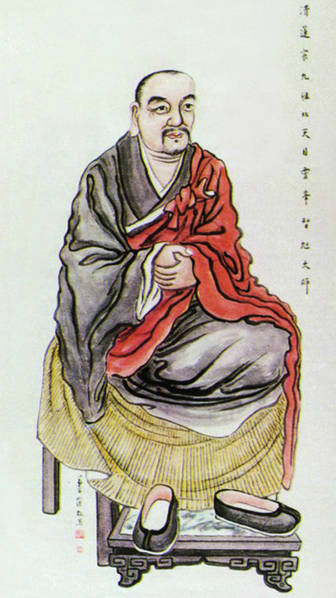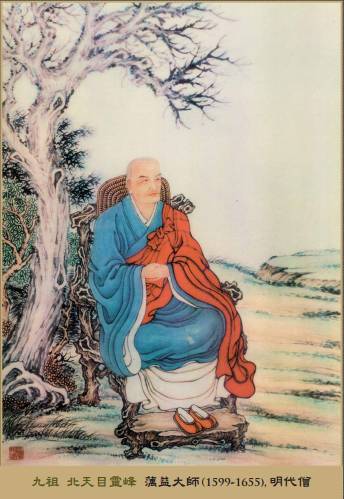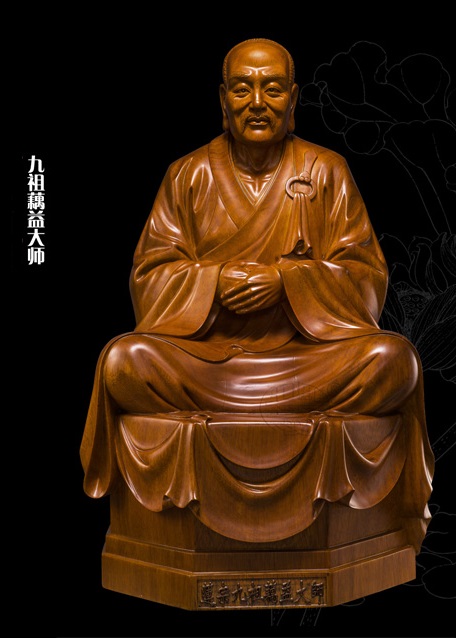ZEN MESTEREK ZEN MASTERS
« Zen főoldal
« vissza a Terebess Online nyitólapjára

蕅益智旭 Ouyi Zhixu (1599–1655)
Ouyi Zhixu. (J. Gōyaku/Gūyaku Chigyoku; K. Uik Chiuk 蕅 益智旭) (1599–
1655). One of the four eminent monks (si da gaoseng) of the late-Ming dynasty,
along with YUNQI ZHUHONG (1535–1615), HANSHAN DEQING (1546–
1623), and DAGUAN ZHENKE(1543–1604); renowned for his mastery of a
wide swath of Confucian and Buddhist teachings, particularly those associated
with the TIANTAI, PURE LAND, and CHAN traditions. In his youth, he studied
Confucianism and despised Buddhism, even writing anti-Buddhist tracts. He had a
change of heart at the age of seventeen, after reading some of Zhuhong’s
writings, and burned his previous screeds. According to his autobiography, Zhixu
had his first “great awakening” at the age of nineteen while reading the line in the
Lunyu (“Confucian Analects”) that “the whole world will submit to benevolence”
if one restrains oneself and returns to ritual. After his father’s death that same
year, he fully committed himself to Buddhism, reading sūtras and performing
recollection of the Buddha’s name (NIANFO) until he finally was ordained under
the guidance of Xueling (d.u.), a disciple of Hanshan Deqing, at the age of
twenty-four. At that time, he began to read extensively in YOGĀCĀRA
materials and had another great awakening through Chan meditation, in which he
experienced body, mind, and the outer world suddenly disappearing. He next
turned his attention to the bodhisattva precepts and the study of vinaya. Following
his mother’s death when he was twenty-seven, Zhixu rededicated himself to Chan
meditation, but after a serious illness he turned to pure land teachings. In his early
thirties, he devoted himself to the study of Tiantai materials, through which he
attempted to integrate his previous research in Buddhism and began to write
commentaries and treaties on Buddhist scriptures and on such Confucian classics
as the Zhouyi (“Book of Changes”). In the late-sixteenth century, Jesuit
missionaries such as Michele Ruggieri (1543–1607) and Matteo Ricci (1552–
1610) had reintroduced Christianity to China and sought “to complement
Confucianism and to replace Buddhism.” This emerging religious challenge led
Zhixu to publish his Bixie ji (“Collected Essays Refuting Heterodoxy”) as a
critique of the teachings of Christianity, raising specifically the issue of theodicy
(i.e., why a benevolent and omnipotent god would allow evil to appear in the
world); Zhixu advocates instead that good and evil come from human beings and
are developed and overcome respectively through personal cultivation. After
another illness at the age of fifty-six, his later years were focused mostly on pure
land teachings and practice. In distinction to Japanese pure land teachers, such as
HŌNEN (1133–1212) and SHINRAN (1173–1262), who emphasized exclusively
Amitābha’s “other-power” (C. tali; J. TARIKI), Zhixu, like most other Chinese
pure land teachers, advocated the symbiosis between the other-power of
Amitābha and the “self-power” (C. jiri; J. JIRIKI) of the practitioner. This
perspective is evident in his equal emphasis on the three trainings in meditation
(Chan), doctrine (jiao), and precepts (lü) (cf. TRIŚIKṢĀ). Ouyi’s oeuvre
numbers some sixty-two works in 230 rolls, including treatises and commentaries
on works ranging from Tiantai, to Chan, to Yogācāra, to pure land. His pure land
writings have been especially influential, and his Amituojing yaojie (“Essential
Explanations” on the AMITĀBHASŪTRA) and Jingtu shiyao (“Ten Essentials on
the Pure Land”) are regarded as integral to the modern Chinese Pure Land
tradition.
(The Princeton Dictionary of Buddhism, 2014)
Four Eminent Monks of the Wanli Era (Wanli si gaoseng 萬曆四高僧)
Hanshan Deqing 憨山德清 (1546–1623)
Daguan Zhenke 達觀真可 (1543–1603), aka 紫栢真可 Zibo Zhenke
Yunqi Zhuhong 雲棲株宏 (1535–1615), aka 蓮池祩宏 Lianchi Zhuhong
Ouyi Zhixu 蕅益智旭 (1599–1655)


蕅益智旭 Ouyi Zhixu. 淨宗九祖 The 9th patriarch of the Pure Land School.
http://www.mdxv.idv.tw/ancestorlist.php?cid=157
http://blog.sina.com.cn/s/blog_7a0389cb0102vl1s.html
http://www.sengfeng.com/newsdetail.aspx?NewsID=8&CateID=409
http://www.amtb-huayan.org.my/about-huayan/ancestors/
"Of the 13 patriarchs of the Pure Land School, there are seven who are accomplished Chan Masters. They are: Cheng Yuan 承遠, Yong Ming 永明, Lian Chi 蓮池, Ou Yi 藕益, Xing Ce 行策, Sheng An 省庵 and Che Wu 徹悟."
http://www.chanpureland.org/qa/chan-patriarchs-teach-pure-land
http://www.thomehfang.com/kumarajiva/13Patriarchs/13Patriarchs_20Nov2003.htm
PDF: Pì xiè jí 闢邪集: Collected Refutations of Heterodoxy by Ouyi Zhixu (蕅益智旭, 1599–1655)
Translated by Charles B. Jones
Pacific World: Journal of the Institute of Buddhist Studies, Third Series, Number 11, Fall 2009, pp. 351-407.
This is a translation of an extensive anti-Jesuit pamphlet written by the monk Ouyi Zhixu (1599-1655). It makes extensive refutations of Matteo Ricci's "True Meaning of the Lord of Heaven," Giulio Aleni's "Records of Learned Conversations at Fuzhou," and two other minor Jesuit publications.
Duplicitous Thieves: Ouyi Zhixu’s Criticism of Jesuit Missionaries in Late Imperial China
by Beverley Foulks
Chung-Hwa Buddhist Journal (2008, 21:55-75)
https://web.archive.org/web/20180409230814/https://chinesebuddhiststudies.org/previous_issues/chbj2104-New_Foulks_CHBJ_V21.pdf